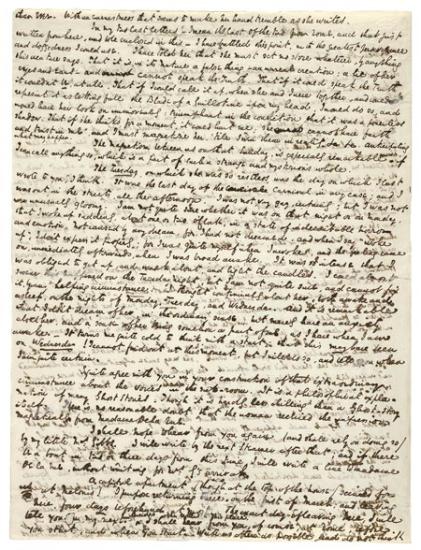Letter 15 | 10 February 1845 | to Emile de la Rue, page 2

Autograph letter signed, Naples, 10 February 1845, to Emile de la Rue
Purchased in 1968
Dickens's letters to Emile de la Rue included progress reports on the positive effects of his mesmeric treatment of Madame de la Rue, which was no less fervent for being, by this stage, conducted in absentia. Utterly confident in his powers, Dickens told de la Rue that, "when I think of all that lies before us, I have a perfect conviction that I could magnetize [hypnotize] a Frying-Pan." The biographer Fred Kaplan argued: "Mesmerism provided Dickens not only with a rationale for the working of personality and mind . . . but with a language and an imagery that could be dramatically utilized in fictional creation." But Peter Ackroyd has suggested that for Dickens mesmerism was "part of his need to control, to dominate, to manipulate."
Mesmerism
In his life and art, Dickens worked energetically for healing. His fiction exposed many of the social ills of his day, and a significant portion of his later journalism is devoted to an impassioned campaign to improve sanitation and public health. Although he was a committed evolutionist and progressive in his attitude toward science and the improvements wrought by technological advances, he was also, by imagination and temperament, attracted to the fantastic and pseudoscientific. This was manifested in his interest in spontaneous combustion and phrenology as well as his fervent belief and active experiments in mesmerism (or "animal magnetism"), an early type of hypnotism.
Dickens was introduced to mesmerism through Dr. John Elliotson, his family physician and one of his "most intimate and valued friends." He became convinced of the therapeutic effects of mesmerism after witnessing Elliotson's demonstrations in 1838, and, although there is no record of Dickens undergoing the procedure, he learned to mesmerize others. Throughout the 1840s, he conducted mesmeric experiments on his wife and friends.
than ever. With an earnestness that seems to make her hand tremble as she writes.
In my two last letters—I mean the last of the two from Rome, and that just written from here, and to be enclosed in this—I have battled this point, with the greatest perseverance and doggedness I could use. I have told her that she must set no store whatever, by anything this creature says. That it is in its Nature a false thing—an unreal creation; a lie of her eyes and Ears—and cannot speak the Truth. That if it could speak the Truth, it couldn't be, at all. That if I could call it up, when she and I were together, and could represent it as letting fall the Blade of a Guillotine upon my head, I would do so, and would have her look on immoveably: triumphant in the conviction that it was a powerless shadow. That if she thinks, for a moment, it could hurt me; she cannot have faith and trust in me, and I must magnetize her, 'till I win them in reality—&c&c. Anticipating what may happen.
The Magnetism between us on that Sunday, is especially remarkable—if I can call anything so, which is a part of such a strange and mysterious whole.
The Tuesday, on which she was so restless, was the day on which I last wrote to you, I think. It was the last day of the Carnival in any case; and I was out, in the streets, all the afternoon. I was not very gay, certainly; but I was not unusually gloomy. I am not quite sure whether it was on that night or on Monday, that I woke up suddenly, about one or two o'Clock, in a state of indescribable horror and emotion. Not caused by any dream, for I had not dreamed. And when I say "woke up", I don't express it properly; for I was quite myself when I awoke, and the feeling came on, immediately afterwards, when I was broad awake. It was so intense that I was obliged to get up, and walk about, and light the candles. I could almost swear this happened on the Tuesday Night, but I am not quite sure, and cannot fix it, by any helping circumstance. I thought continually about her, both awake and asleep, on the nights of Monday, Tuesday, and Wednesday. And it is remarkable that I don't dream of her, in the ordinary sense; but merely have an anxiety about her, and a sense of her being somehow a part of me, as I have when I am awake.—It turns me quite cold to think, with a start, that this may have been on Wednesday! I cannot find out at this moment, but I will do so, and tell you when I am quite certain.
I quite agree with you in your construction of that extraordinary circumstance about the voices in the sick-room. It is a philosophical explanation of many Ghost Stories. Though it is hardly less chilling than a Ghost-Story itself. There is no reasonable doubt that the woman received the impression magnetically from Madame De la Rue.
I shall hope to hear from you again (and shall rely on doing so) by my little Mrs. Gibbs. I will write by the next Steamer after that; and if there be a boat in two or three days from this time, I will write a line to Madame De la Rue, without waiting for Mrs. G's arrival.
A capital apartment (though at the top of the house) secured for us at Meloni's! I purpose returning there, on the first of March; and leaving here, four days beforehand, at most. The exact day of leaving here, I will tell you in my next. Besides other letters to this place, I shall hear from you, of course, at Rome, before you start, and when you start. Write as often as possible—and do not think